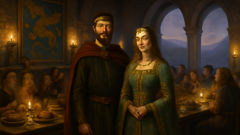Introduction
Across the mist-shrouded hills and deep, mossy forests of medieval Wales, the tales of the Mabinogion echo with the rhythm of a world both familiar and enchanted. One such tale begins in the ancient kingdom of Dyfed, a land at the edge of the known world, where the boundaries between reality and magic are as thin as a veil of morning fog. Here, in this green and gold tapestry woven from legend, stands Manawydan, son of Llyr—a man whose fate is as turbulent as the western seas from which his father’s name was drawn. His story is a thread that binds sorrow to hope and loss to restoration, winding through shadow and light, trial and wonder. The third branch of the Mabinogi unfolds not as a simple hero’s journey, but as a symphony of resilience: a prince who loses everything to enchantment, yet clings to loyalty and wisdom when all else is swept away. Within these pages, castles appear and vanish, fields wither into wasteland, and the shadows of ancient feuds reach across generations. Manawydan’s trials begin as a simple wedding feast, celebrated with laughter beneath banners fluttering in the crisp Welsh air. Yet as spells unravel and friends are lost to forces unseen, the heart of the story pulses with questions of fate and free will. What does it mean to stand fast when your world is emptied by magic? How does one confront the invisible adversaries of bitterness, jealousy, and despair? As the story unfolds, the reader is drawn into a landscape where every tree and stone is steeped in history, and every shadow might conceal a riddle or a rescue. The tale of Manawydan, son of Llyr, invites us to walk ancient paths—through haunted forests, silent cities, and fields left barren by curses—and to discover the courage that flourishes when hope seems lost. In this retelling, the legends of Wales awaken once more, their lessons as vital today as they were to those who first gathered by firelight to listen.
The Vanishing of Dyfed
The morning after the grand wedding feast in Dyfed dawned crisp and bright. The air was sweet with dew and the promise of a new beginning. Pryderi, prince of Dyfed and son of Rhiannon, walked arm-in-arm with his wife Cigfa through the castle gardens, laughter still ringing from the previous night. Manawydan, brother of the mighty Bran, watched them with a gentle smile—his own heart lighter than it had been since the loss of his homeland. For years, he’d wandered as an exile, the legacy of his father Llyr a distant memory. Now, as Rhiannon’s guest and Pryderi’s friend, Manawydan found solace in Dyfed’s peace and beauty.

But peace is a fragile thing. That very day, as the sun reached its zenith, a low mist rose across the fields. It crept through the woods and over the hedgerows, swirling around the castle walls until the world outside blurred. The laughter faded. The birds fell silent. When the mist finally lifted, Manawydan and his companions stepped outside to a land transformed. Dyfed was empty. Where once there had been villages and farms, there was nothing but tangled thickets and echoing silence. Every living soul—save Manawydan, Rhiannon, Pryderi, and Cigfa—had vanished. No oxen plowed the fields, no dogs barked in the distance, no smoke curled from the thatched roofs. The land itself felt hollowed out, as if some great hand had swept it clean.
Panic threatened to rise, but Manawydan’s voice steadied the group. "Let us search for survivors," he said, his words measured and calm. They traveled the breadth of Dyfed for seven days and seven nights, venturing into forests and valleys once vibrant with life. All the while, an uncanny hush followed them. There were no answers to their calls, no tracks or traces left behind. At night, they gathered by the dying embers of their campfires, each gripped by their own fears. Pryderi raged against the injustice; Rhiannon’s eyes shone with quiet pain; Cigfa clung to hope that this was only a passing nightmare.
At last, Manawydan spoke: "We cannot linger in sorrow. If Dyfed is lost to us for now, let us make a life elsewhere until this enchantment passes." The suggestion brought little comfort, but the four companions had little choice. Gathering what provisions they could, they set out for England. In Hereford, they tried their hands at various crafts—saddlery, shield-making, shoemaking—each time gaining such fame for their skill that local tradesmen, threatened by their artistry, drove them out. Each attempt at building a new life was undone by jealousy and misfortune. Yet through all this, Manawydan remained resolute, his patience unyielding. He urged his friends to return with him to Dyfed, reasoning that it was better to endure hardship on familiar soil than to face hostility as strangers.
Back in the empty kingdom, they resumed their wandering. Time passed slowly in that ghostly land. Pryderi, unable to bear idleness, suggested hunting. On one fateful day, they pursued a white boar into a hidden valley. The creature vanished into a mysterious fortress that stood where no building had been before. Against Manawydan’s warnings, Pryderi entered the castle alone—and did not return. Rhiannon, desperate to save her son, followed, only to be caught by the same sorcery. Now only Manawydan and Cigfa remained, alone in a land both beautiful and forsaken.
Through it all, Manawydan’s determination did not waver. He comforted Cigfa and took up simple farming, sowing wheat in Dyfed’s empty fields. Yet even his crops were not spared: each night, as the wheat ripened, it was stolen—devoured down to the earth. Manawydan kept watch and discovered the thieves were no ordinary men but a horde of enchanted mice. With quiet cunning, he captured one mouse, slow and heavy with grain. As he prepared to punish it, three mysterious strangers appeared in turn, each offering ransoms for the mouse’s life. The third, a druid of powerful magic, revealed himself as Llwyd ap Cil Coed—the very wizard who had enchanted Dyfed in vengeance for an ancient wrong.
Manawydan bargained with wisdom and restraint. He demanded the release of Pryderi and Rhiannon, and the restoration of Dyfed to its former glory. The druid, seeing he could not outwit Manawydan, agreed. In a swirl of magic, the land blossomed back to life. Villages reappeared; laughter returned to the fields; friends and kin found their way home. The enchantment was lifted not by force or violence, but by the patient courage and cleverness of Manawydan, who held fast when all seemed lost.
Restoration and Release
The spell was broken, but the memory of loss lingered like morning dew on the grass. As color and sound returned to Dyfed, Manawydan stood quietly at the threshold of his new life, reflecting on the nature of trials and the roots of resilience. The restored kingdom pulsed with renewed vigor: farmers sowed seed where weeds had ruled, children’s laughter echoed in the meadows, and markets bustled with the exchange of goods and stories. The hardships endured became threads in the tapestry of the land’s legend—tales whispered from hearth to hearth.

For Manawydan, the joy of reunion was tempered by humility. He had not won Dyfed back through heroism in battle or feats of magic, but by holding fast to reason and empathy. His refusal to harm even a thieving mouse—his insistence on negotiation over vengeance—had unraveled the enchantment’s knot. Pryderi and Rhiannon returned, dazed but unharmed, and Cigfa’s faith was rewarded. The four friends embraced, laughter mingling with tears, all too aware that their bonds had deepened in adversity.
The people of Dyfed soon learned the truth of their disappearance: Llwyd ap Cil Coed’s grudge against Rhiannon had stretched across years and kingdoms, a chain forged from ancient feuds. But the cycle of revenge was broken not by force but by understanding. Manawydan’s clever diplomacy forced Llwyd to confront the futility of endless retribution. With a final gesture of goodwill, Llwyd promised never to trouble Dyfed again, and the hidden fortress that had swallowed Pryderi and Rhiannon faded into legend.
Life resumed its familiar rhythms. Manawydan, though offered the throne, chose instead a life of contemplation and quiet stewardship. He walked often among the fields, greeting those he had helped restore to life. His story became a touchstone for generations: a reminder that hope can be kindled in the darkest times, and that wisdom often lies in patience rather than might. The land of Dyfed flourished, its fields ripe with promise, its people mindful of how quickly fortune can turn—and how steadfastness can bring it back around.
As the years passed, songs were sung in Manawydan’s honor. Children acted out the tale of the enchanted mice and the clever prince who freed a kingdom with his wits. Rhiannon’s laughter was heard once more at feasts, and Pryderi’s leadership grew wise under his friend’s example. Even Cigfa, once fearful and uncertain, found strength in her trials. The story of Dyfed’s enchantment became more than legend; it was a lesson written into the land itself, reminding all who heard it that perseverance and compassion are powers greater than any spell.
Conclusion
The tale of Manawydan, son of Llyr, lingers long after its final lines. In its heart lies a truth that transcends myth: when confronted with forces that strip us of all we hold dear, it is not always the strongest or boldest who prevail, but those who endure with humility and wisdom. Manawydan’s journey through enchanted Dyfed is not just a battle against magic, but an inward odyssey—a testament to patience, cleverness, and the enduring strength of hope. His refusal to answer cruelty with cruelty opened the way for healing not only of a land, but of ancient wounds between families and kingdoms. In restoring Dyfed, he restored something in himself and in all who hear his story: the conviction that even when darkness falls and all seems lost, kindness and perseverance can work miracles. To walk in Manawydan’s footsteps is to remember that sometimes, the greatest magic is the courage to begin again.













